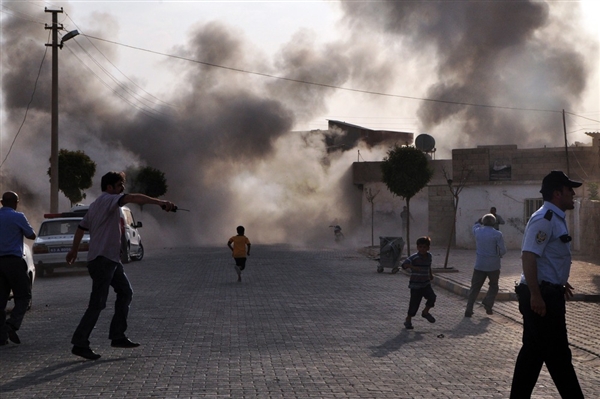
The October 3 spillover of violence in Syria across the border to Turkey has added a new edge to the campaign Prime Minister Erdoğan’s Administration has been waging to convince its allies and friends that Syria is spinning out of control, increasingly threatening regional peace and stability, and warranting a firmer response.
Syrian mortars fell on the town of Akçakale, which lies close to the border and south of one of Turkey’s larger cities in that part of the country, Şanlıurfa. Turkey promptly fired back. This exchange occurred in a context of ongoing activity along the border in this area. It includes a recent rebel attempt to take control of a border crossing post there. In the aftermath of that fight, Syrian forces have reportedly been engaged with rebel forces quite close to the border. The mortar fire could have been accidental (though this seems highly unlikely for a military as proficient as Syria’s) but more likely was intended to strike at support base(s) used by the rebels, who probably have been passing back and forth across the border for some time. Turkey has been signaling that further provocations from the Syrian side would be met with a sharp reply. Toward that end, its military had reinforced its positions in the area and moved to better control movements across the border so as to minimize the possibility of incidents or miscalculations. It also determined to punch the Syrians hard if their actions close to the border got out of hand.
Just as Ankara took the June 22 Syrian downing of a Turkish F-4 fighter jet to Brussels as a way to galvanize NATO solidarity at a time of rising turmoil on its southern frontier, so it did immediately after the October 3 exchange with Syria. Nothing in the intervening weeks since the F-4 incident lessened Turkey’s increasing sense that it is exposed and alone in the face of obviously rising instability along its southern border–alone specifically in the sense of what it regards as silence on the part of its allies. Turkish Foreign Minister Ahmet Davutoğlu was reportedly flabbergasted that his tough line on Syria during the opening of the UN General Assembly in late September got so little resonance or response. The Akçakale salvos add urgency to his efforts and to the need to galvanize a stronger international response that will better contain, if not calm, the growing instability in Syria.
Meeting late in the night on October 3, North Atlantic Council ambassadors heard a report from the Turks and issued a strong statement of support. Syria’s actions were “strongly condemned” and a declaration was issued that “the Alliance continues to stand by Turkey and demands the immediate cessation of such aggressive acts against an Ally, and urges the Syrian regime to put an end to flagrant violations of international law.”
In the days ahead, it will be important for NATO leaders–national leaders, as well as Secretary General Fogh Rasmussen and member state ambassadors in Brussels–to continue to speak out strongly in support of Turkey and of Alliance interests in its security. They should make clear that Syrian action across the border will be regarded as an Alliance issue. This will help to deter further incidents or worse. While the invocation of Article 5 seems quite premature at this point, such political support for Turkey now will be important for Alliance solidarity–and for keeping Turkey firmly in and with the West. It will also be crucial for containing the consequences of Syria’s implosion and ensuring the Alliance has capabilities–i.e., in Turkey–for dealing with greater Syria-related dangers to come.
Ross Wilson served as America’s ambassador in Turkey from 2005-2008. He is currently Director of the Dinu Patriciu Eurasia Center at the Atlantic Council.
Photo credit: Rauf Maltas / ANA via AFP – Getty Images
Image: 121003-turkey-syria-740a.photoblog600.jpg
